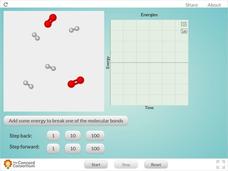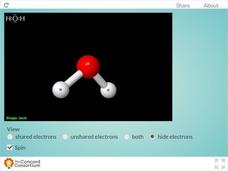Concord Consortium
Reaction Between Hydrogen and Oxygen Molecules
When molecules of hydrogen and oxygen are combined, how does water form? Science scholars observe changes in kinetic and potential energy during a chemical reaction in an interactive. The resource features easy controls that allow users...
PhET
Molecule Shapes: Basics
In molecules, bonds rotate about the nucleus due to the repulsion of subatomic particles. In a simulation, learners manipulate the bonds of a molecule to meet the atoms' needs. They can then see the specific molecular shapes of five...
Concord Consortium
Unshared Electrons and the "Bent" Shape
Why is water always so bent out of shape? Scholars investigate the molecular geometry of the water molecule using a 3-D resource. The interactive features options such as rotation and the ability to view electron pairs.
Learning Games Lab
Nitrogen in Pollutants
Responsible farming is important for maintaining natural resources. Eager scientists complete a WebQuest to explore what happens to nitrogen when it enters the soil. They learn about the chemical makeup of nitrogen-based molecules...
Concord Consortium
Aquapores
Aquapores allow water to travel through cell membranes while keeping other molecules out. The animation offers an up-close look at these parts of the cell membrane. It explores multiple vantage points and shows the importance of these...
Learning Games Lab
Cattle Feeding
Finding a balance between too much protein and not enough doesn't have to be a guessing game. Young scientists use an interactive lesson to learn how to calculate protein content in cattle feed and how to mix feed to create the ideal...
PhET
Reactants, Products and Leftovers
Did you know when you mix the reactants sulfur, tungsten, and silver, you get the products SWAg? The simulation begins with making sandwiches, to show pupils reactants and products of something familiar. They then can make water,...
Concord Consortium
Concord Consortium: Molecular Workbench: Water Molecules & Carbon Nanotubes
View this simulation to observe how water molecules move through carbon nanotubes.
Concord Consortium
Concord Consortium: Molecular Workbench: Water and Polar Substances
Adjust amounts of ionic charges in this simulation to see how water molecules react to polar substances in solution.
Other
Chemical Education Digital Library: Carbonic Acid H2 Co3
A 360 degrees view virtual model of a carbonic acid molecule. Students can manipulate the model to explore its properties.
Concord Consortium
The Concord Consortium: Molecular Workbench Micelle Formation
Watch how micelle formation changes in a solution with water compared to a solution consisting of oil.










